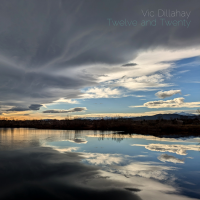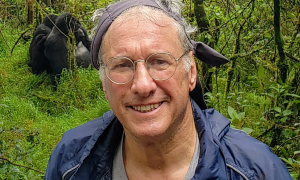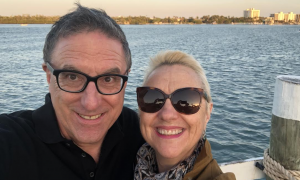Home » Jazz Articles » Out and About: The Super Fans » Meet Clifford Bass
Meet Clifford Bass

I was mesmerized by the 14-minute, full-side recording of [Coltrane's] 'My Favorite Things,' listening to it over and over again, often making the excuse to myself that I would listen to it only one more time before starting my homework.
Tell us a bit about yourself.
I am a semi-retired partner in a law firm where I was previously a litigator. I still do some consulting for them. My passions are jazz, travel, and theatre. I live in Westchester County, north of New York City, and grew up in Chicago.What's your earliest memory of music?
Other than nursery rhymes, my earliest memory of music was listening to Dick Biondi on WLS Radio in Chicago, and to my sister's 45's, which included Bobby Rydell, Elvis Presley, and early Motown.How old were you when you got your first record?
I was ten when I got my first record, holiday shopping with my grandfather, who would take out all four grandchildren and buy us gifts, which we would then open up a few weeks later. My first three albums were influenced by what I heard on the radio: The Best of Nat King Cole , as "Those Lazy, Hazy, Crazy Days of Summer" was a big hit; The Best of the Kingston Trio ; and the cast album for Oliver . From those early days, I favored the Nat King Cole album, memorizing the lyrics to "Route 66," "Paper Moon," "Mona Lisa," and "Straighten Up and Fly Right."What was the first concert you ever attended?
My parents took me to my first concert: Peter, Paul and Mary performing at the McCormack Place Theatre in Chicago. They had just recorded "Lemon Tree" and "If I Had a Hammer." My father listened to The Weavers and Odetta, and the concert enhanced my interest in folk music. Years later, I would watch American Bandstand, Soul Train, Hullabaloo , and Hootenanny .Was there one album or experience that was your doorway to jazz?
As a senior in High School, I clipped postage stamps for the Columbia Records mail order music club, from which you could get 12 albums for a ridiculous price of $1.00, on the proviso that you then purchased their recommended album or another record each month thereafter. By then I was, like everyone my age, a fan of The Beatles and The Rolling Stones, yet I also had every Bob Dylan and Mothers of Invention album, so there was an early deviation from the norm. After selecting eight or nine rock albums from the Columbia Record Club, I bought three jazz albums, which I will never forget: John Coltrane's, My Favorite Things , because I knew the song from The Sound of Music ; Dave Brubeck's Time Out , because it was highlighted in the Columbia Record Club advertisement (plus, I had gone to summer camp one year with Chris Brubeck); and Larry Young's Unity , because I thought the cover was cool. I was mesmerized by the 14-minute, full-side recording of "My Favorite Things," playing it over and over again, often telling myself I would listen to it only one more time before starting my homework.How long have you been going out to hear live jazz?
I have been going out to hear live jazz for over 50 years, exponentially so over the last 15 to 20 years, since my two daughters left home for college and, ultimately, their careers.How often do you go out to hear jazz?
Three to five times a week.What is it about live music that makes it so special for you?
Live music is so much better than recorded music that I seldom listen to CD's or vinyl records anymore, opting instead to go to a club as often as possible. Admittedly, while I often go to a jazz concert in an auditorium or at festivals, I much prefer a club setting: the spontaneity, the interplay of artists in an ensemble, and improvisation, are all appreciated in either venue, but in a club there is a closer connection with the audience, a fourth wall that evaporates, an almost symbiotic relationship between audience and artist. Concerts and festivals enable you to see world famous performers, who rarely do the club scene, and ensembles of artists who seldom play togetherWhat are the elements of an amazing jazz concert?
For me, the more spontaneity and improvisation by talented artists, the better the concert, with the exception that when a big band is performing, precision within and between each section is necessary. Those rare moments when the unimaginable takes place—an incredible solo, a guest sitting in, creative scatting or vocalese—make an amazing concert.What's the farthest you've traveled to get to a jazz performance?
I try to see live jazz whenever I am in a foreign country, and I have travelled to 98 countries, to date. The furthest I have traveled for scheduled festivals is Monterey, California and New Orleans.Is there one concert that got away that you still regret having missed?
I am sorry that I missed Herbie Hancock and Chick Corea, who played together at Carnegie Hall a few years ago. As far as I know, it was the only time they played together, at least without an ensemble. Two jazz giants, two pianos... that was all.If you could go back in time and hear one of the jazz legends perform live, who would it be and why?
Although there are a number of jazz legends who I wish I had seen live—such as Charlie Parker, Ella Fitzgerald, John Coltrane, and Duke Ellington—fortunately their music has been preserved in videos and on recordings. I would like to hear Chick Webb live, as the few recordings and videos of him are of poor quality, yet otherwise reflect the excitement and expertise he conveyed as a drummer under immense odds, due to his hunchbacked stature from a childhood spinal injury.What makes a great jazz club?
A great jazz club has to have good sight lines wherever you sit, a quiet bar area, excellent sound and lighting, and it needs to be small enough to ensure a modicum of intimacy between the artists and the audience. My favorite club that incorporates these qualities is Birdland in New York City. The most memorable club I have been in was a basement dive in Kiev, The Cotton Club, nearly ten years ago, where a ten-piece ensemble with a female vocalist with a heavy Ukrainian accent sang "'Sveet Georgia Brown."Which club(s) are you most regularly to be found at?
Birdland, Smoke Jazz & Supper Club, Blue Note in New York City, and Jazz Forum in Tarrytown, New York.How do you discover new artists?
For instrumentalists, I find that jam sessions at local clubs and small-scale venues, or free summer concerts, introduce me to new artists. Janis Siegel and Lauren Kinhan's "Vocal Mania" series, in New York, and their marvelous virtual show, "Vocal Gumbo," born during the height of COVID, introduced me to many vocalists, as did (until his recent passing) Michael Bourne's "Singers Unlimited" show on the Newark, NJ, radio station, WBGO.What was it like for you in 2020, when all the clubs closed down?
Broadcasts from the living rooms/private studios of Emmet Cohen, Kermit Ruffins, Jay Leonhart, Alexis Cole (singing from her homemade sauna in Pennsylvania, no less), Fred Hersch, Eric Alexander, and rare "busking" outdoor concerts by David Ostwald (at times including Anat Cohen and Bria Skonberg) in Riverside Park, etc., got me through the first year of the pandemic. I also viewed seminars on Alexis's platform, JazzVoice.com.Is there a club that's no longer around that you miss the most?
I miss the Lenox Lounge and Sweet Basil in New York City.Do you have a favorite jazz anecdote?
I was at Boston Garden in 1970 or 1971, where George Wein held a one-night benefit entitled "Salute to Newport." In addition to Aretha Franklin and Roberta Flack, the lineup included Dizzy Gillespie, Marian McPartland, and Ray Charles. Charles Mingus was playing with Philly Joe Jones in an ensemble that was supposed to include Cannonball Adderley, who couldn't make it. George Wein told the crowd that he'd telephoned an old friend of his who had agreed to come, and introduced Dave Brubeck. Mingus towered over Brubeck sitting at the keyboard, their faces a foot or two apart, as they initially exchanged riffs in a frenetic manner, leading to their playing over each other simultaneously. Suddenly they both stopped thinking the other would continue, and there was unexpected silence. Brubeck took three fingers to the keyboard—"da dink, da dink, da dink"—and then both renewed their frenetic playing and the crowd went wild.After the concert, my friend and I took a staircase down, thinking it would be the fastest way to exit, and found ourselves on the cinder track beneath the Garden's floor, where circus animals are transported. In front of us was a huge man, hunched forward, pulling a huge container on wheels. "That's Mingus," I said, and ran up to him. Mingus was a daunting character, unapproachable to musicians and fans alike. He looked grudgingly at me and I said, "That was fantastic: Have you ever played with Brubeck before?" Mingus responded in a gruff baritone that would intimidate anyone, especially a long-haired college kid, "Yeah, once. Same thing happened; same thing happened."
Vinyl, CDs, MP3s?, streaming?
CD's and occasional vinyl still.If you were a professional musician, which instrument would you play and why?
Piano, due to its versatility.What's your desert island disc?
Boppin' at the Blue Note with Jon Hendricks and Wynton Marsalis.What do you think keeps jazz alive and thriving?
Incorporating new genres of music, fusing or merging with jazz, is necessary to keep it alive and thriving. I recently spoke with Christian McBride, who is now in charge of programming the Newport Jazz Festival All Stars, and expressed my surprise that Ron Carter played the first slot early in the morning on the last day of the Festival, and he was followed by two hip hop performers who, in part, yelled obscenities at the audience. It is understood that this diversity is necessary to attract a younger audience. Similarly, in the 1960s George Wein featured Sly and the Family Stone, whose popularity with the audience is said to have inspired Miles Davis to record Bitches Brew, which came out shortly thereafter.Finish this sentence: Life without music would be...
Extremely difficult to bear.Is there anything else we should know about you?
Duke Ellington said, "There are two types of music: good music and bad music." I find that an appreciation of jazz has enhanced my interest in other musical genres, from opera to Opry. I also love the theatre, seeing three to four shows a week on or off Broadway.Tags
Out and About: The Super Fans
Tessa Souter and Andrea Wolper
New York City
Chicago
Dick Biondi
WLS Radio
Bobby Rydell
Elvis Presley
Motown
Nat King Cole
Peter, Paul and Mary
the Weavers
Odetta
Beatles
Rolling Stones
Bob Dylan
Mothers of Invention
John Coltrane
Dave Brubeck
Larry Young
Herbie Hancock
Chick Corea
Carnegie Hall
Charlie Parker
Ella Fitzgerald
duke ellington
Chick Webb
Birdland
Smoke
Blue Note
Jazz Forum
Janis Siegel
Lauren Kinhan
Michael Bourne
Emmet Cohen
Kermit Ruffins
Jay Leonhart
Alexis Cole
Fred Hersch
Eric Alexander
David Ostwald
Anat Cohen
Bria Skonberg
Lenox Lounge
Sweet Basil
Boston Gardens
George Wein
Aretha Franklin
Roberta Flack
Dizzy Gillespie
Marian McPartland
Ray Charles
Charlie Mingus
Philly Joe Jones
Cannonball Adderley
Jon Hendricks
wynton marsalis
Christian McBride
newport jazz festival
Sly and the Family Stone
Miles Davis
PREVIOUS / NEXT
Support All About Jazz
 All About Jazz has been a pillar of jazz since 1995, championing it as an art form and, more importantly, supporting the musicians who make it. Our enduring commitment has made "AAJ" one of the most culturally important websites of its kind, read by hundreds of thousands of fans, musicians and industry figures every month.
All About Jazz has been a pillar of jazz since 1995, championing it as an art form and, more importantly, supporting the musicians who make it. Our enduring commitment has made "AAJ" one of the most culturally important websites of its kind, read by hundreds of thousands of fans, musicians and industry figures every month.


























